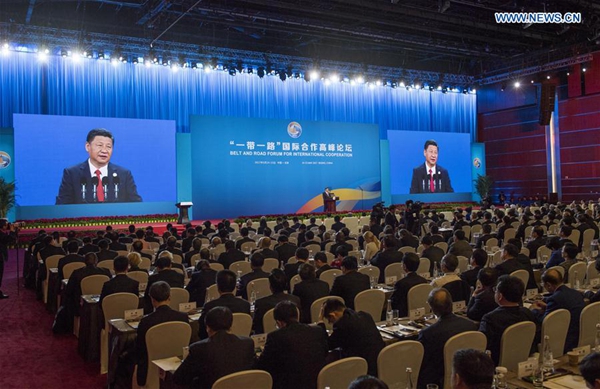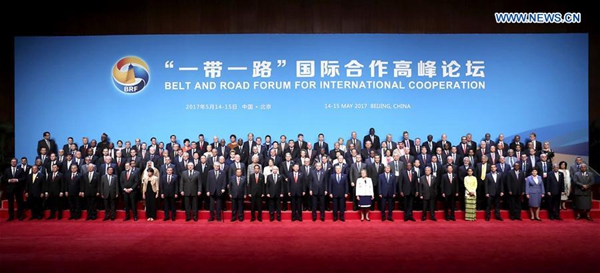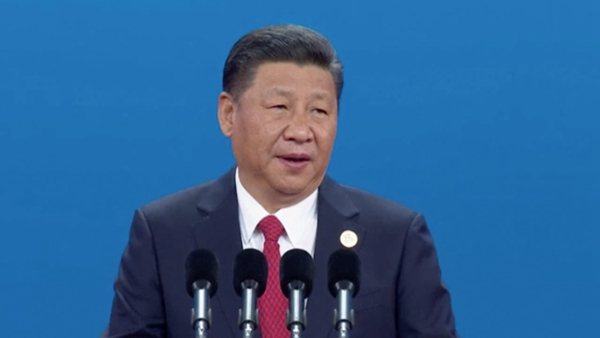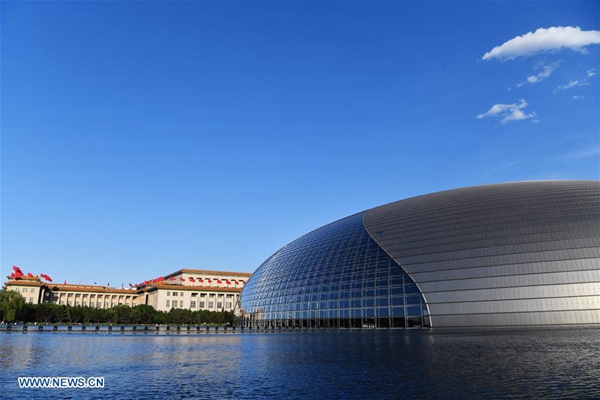Xi highlights peace, prosperity, opening up of Belt and Road
|
|
| Chinese President Xi Jinping delivers a keynote speech at the opening ceremony of the Belt and Road Forum for International Cooperation in Beijing, capital of China, May 14, 2017. (Xinhua/Li Xueren) |
Chinese President Xi Jinping said Sunday the Belt and Road should be built into a road of peace, prosperity, opening up, innovation and connecting different civilizations.
He proposed the five guiding principles for the pursuit of the Belt and Road initiative while delivering a keynote speech at the opening of the two-day Belt and Road Forum for International Cooperation in Beijing.
“The ancient silk routes thrived in times of peace, but lost vigor in times of war. The pursuit of the Belt and Road Initiative requires a peaceful and stable environment,” said Xi.
“We should foster a new type of international relations featuring win-win cooperation; and we should forge partnerships of dialogue with no confrontation and of friendship rather than alliance,” he said.
He called for fostering the vision of common, comprehensive, cooperative and sustainable security, and creating a security environment built and shared by all.
The president urged the Belt and Road to be built into a road of prosperity.
“In pursuing the Belt and Road Initiative, we should focus on the fundamental issue of development, release the growth potential of various countries and achieve economic integration and interconnected development and deliver benefits to all,” he said.
Stressing infrastructure connectivity, Xi called for promoting land, maritime, air and cyberspace connectivity, focusing on key passageways, cities and projects, and connecting networks of highways, railways and sea ports.
He called for joint efforts to improve trans-regional logistics network and promote connectivity of policies, rules and standards so as to provide institutional safeguards for enhancing connectivity.
“We should build an open platform of cooperation and uphold and grow an open world economy,” Xi said.
“We should jointly create an environment that will facilitate opening up and development, establish a fair, equitable and transparent system of international trade and investment rules and boost the orderly flow of production factors, efficient resources allocation and full market integration,” he continued.
China welcomes the efforts made by other countries to grow open economies, participate in global governance and provide public goods, he said.
“Together we can build a broad community of shared interests,” he said.
Xi also underlined the role of innovation in pursuing the initiative.
“We should pursue innovation-driven development and intensify cooperation in frontier areas such as digital economy, artificial intelligence, nanotechnology and quantum computing, and advance the development of big data, clout computing and smart cities so as to turn them into a digital silk road of the 21st century.”
Xi urged efforts to strengthen cooperation in ecological and environmental protection and build a sound ecosystem so as to realize the goals set by the 2030 Agenda for Sustainable Development.
“We should ensure that when it comes to different civilizations, exchange will replace estrangement, mutual learning will replace clashes, and coexistence will replace a sense of superiority,” he said.
Xi called for establishing a multi-tiered mechanism for cultural and people-to-people exchanges, building more cooperation platforms and opening more cooperation channels.
The forum, the highest-level international meeting since Xi proposed the Belt and Road Initiative in 2013, gathers 29 foreign heads of state and government leaders as well as delegates from some 130 countries.



